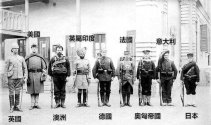@Jono Sir if I may interject, They wanted a say on any possible COC agreement between the Philippine and China. The three of them are claimants , right now Vietnam is sitting on the sideline watching the two spar and able stealthily develop its occupied island. If an agreement had been reach between the two, she will be vulnerable, cause others such as Malaysia and Indonesia will follow suit. So why ruffled the feathers, its better to have an open line of communicate instead of being isolate.If I may venture a guess, I think the improvement is only superficial, as reflected by the fact that Vietnam has so far not shown strong interest to join the Chinese OBOR initiative. please correct me if I am in the wrong.
I guess both sides do not trust each other, but have to live with the fact that they are geographical neighbours.
China being the stronger side, doesn't care much about Vietnam as long as it does not cling to America too closely at the expense of Chinese interests.
Vietnam is probably fearful of its giant neighbour, but can't do anything about it for fear of retributions, financially or militarily or both. so it has to walk a tight rope between China and America.
I would tend to think that one sign of genuine trust / friendship (if at all possible) developed between the two countries will be the construction of a HSR linking the two.
You are using an out of date browser. It may not display this or other websites correctly.
You should upgrade or use an alternative browser.
You should upgrade or use an alternative browser.
Impact of China's rise in the world - Long term predictions (30-50 years)
- Thread starter tamsen_ikard
- Start date
Those are meaningless numbers. Nobody can predict what will happen 50 years from now. 100 years would just be science fiction.
All nations and dynasties and political parties will rise and fall eventually. At some point the PRC will go the way of preceding dynasties and even the nation itself may fracture. But what is amazing about China is that after two thousand years, it can always pick up the pieces after major calamities and rise to the top once more. Same could not be said about other empires.
@siegecrossbow Sir if I may interject, our India is much older than China. We also managed to claim territory from China in Ladakh last year.All nations and dynasties and political parties will rise and fall eventually. At some point the PRC will go the way of preceding dynasties and even the nation itself may fracture. But what is amazing about China is that after two thousand years, it can always pick up the pieces after major calamities and rise to the top once more. Same could not be said about other empires.
if I may be so bold to comment on this:Westerners have the misconception that China is infamous for breaking up, when in fact every empire breaks up, and what makes China different is the incredible tendency to reunite.
Chinese know their history, people always suffered tremendously whenever China was not united by a strong central dynasty / government. Recent history taught that a weak Qing government was one strong factor for foreign powers to come to China and wreak havoc. Hence the collective psyche to support a strong central government at the expense of some personal freedom and political rights.
second, Martin Jacques argued that China is a civilization state united by a strong Chinese culture. As such it is difficult to break up a country united by common culture and ideology, unless due to poor governance and poor economic prospect leading to wide spread discontent among the masses.
@siegecrossbow Sir if I may interject, our India is much older than China. We also managed to claim territory from China in Ladakh last year.
India as a cohesive state didn’t exist before 1948. There had certainly been discernible strands of more or less continuous cultural tradition on the Indian subcontinent that dated back 4000 years to Harappan culture. But that hardly makes it older than China, let along much older. Lengthy strand of continuous cultural traditions extending back to 4000 years ago is also discernible before the first unified cohesive state in Chinese history, formed around 220 BC.
And continuous cultural strands extending back 4000 years, or more, is nothing unique. You can find similarly lengthy cultural strands behind modern societies in the Middle East, in the near East, and even in Meso-America.
India as a cohesive state didn’t exist before 1948. There had certainly been discernible strands of more or less continuous cultural tradition on the Indian subcontinent that dated back 4000 years to Harappan culture. But that hardly makes it older than China, let along much older. Lengthy strand of continuous cultural traditions extending back to 4000 years ago is also discernible before the first unified cohesive state in Chinese history, formed around 220 BC.
And continuous cultural strands extending back 4000 years, or more, is nothing unique. You can find similarly lengthy cultural strands behind modern societies in the Middle East, in the near East, and even in Meso-America.
He was being sarcastic.
All nations and dynasties and political parties will rise and fall eventually. At some point the PRC will go the way of preceding dynasties and even the nation itself may fracture. But what is amazing about China is that after two thousand years, it can always pick up the pieces after major calamities and rise to the top once more. Same could not be said about other empires.
if I may be so bold to comment on this:
Chinese know their history, people always suffered tremendously whenever China was not united by a strong central dynasty / government. Recent history taught that a weak Qing government was one strong factor for foreign powers to come to China and wreak havoc. Hence the collective psyche to support a strong central government at the expense of some personal freedom and political rights.
second, Martin Jacques argued that China is a civilization state united by a strong Chinese culture. As such it is difficult to break up a country united by common culture and ideology, unless due to poor governance and poor economic prospect leading to wide spread discontent among the masses.
Least we forget. A few days ago was the 120 year anniversary of the infamous US troops landed as part of the eight nation alliance.
"On this day in 1900, US troops arrived in Beijing, #China to help crush the Boxer Rebellion. In one of the worst episodes of China’s ‘Century of Humiliation’, a popular rebellion by millions of Chinese people against exploitation and colonisation by imperial powers was crushed by an 8 nation alliance of Britain, the United States, Tsarist Russia, Imperial Japan, Germany, Italy, Austria-Hungary, backed by Netherlands, Belgium and Spain.
Massacres, mass rape, looting and pillaging were perpetrated by the imperial powers, traumatising and angering the population. The event is ingrained in China’s memory as one of the lowest moments in Chinese history, yet in the US, Japan and Europe, many will not have been taught the history of horrors imposed by the imperial powers on the Chinese people."


There is something that should be ingrained in Chinese memory much more deeply than the humiliation of 1900, because it speaks to something much less contingent and much more fundamental, and therefore to something whose implication and correction requires far more calm self examination and introspection, devoid mind clouding effects of chest thumping jingoism, or opportunistic appeal to sense of grievance. That is the fact that from a position of economic and technological leadership in the world at the dawn of the 15th century, China completely missed the boat of subsequent 300 years of epochal progress in science, economics, culture, philosophy, industry, politics and commerce.
China missed that boat not because China was isolated until it was overwhelmed in the 1800 as some claimed, but despite the fact that China had full exposure to these developments and artifacts during the entire 300 year period, but it’s culture persistently failed to recognize not the value of progress elsewhere, nor recognize that China is being left behind, nor what is needed to make up the gap.
Even the Ottoman Empire was not so oblivious, nor allowed herself to be left so far behind.
Why?
China missed that boat not because China was isolated until it was overwhelmed in the 1800 as some claimed, but despite the fact that China had full exposure to these developments and artifacts during the entire 300 year period, but it’s culture persistently failed to recognize not the value of progress elsewhere, nor recognize that China is being left behind, nor what is needed to make up the gap.
Even the Ottoman Empire was not so oblivious, nor allowed herself to be left so far behind.
Why?
Last edited:
Well when you were the top empire existing for thousands of years, your head tends to be stuck up your own rear. The arrogance of the old Chinese was quite frequent. This has been one of the major lessons being taught going forward. Even my father teaches me this when I was only 4 and I do the same to my younger. We see this with the Chinese system and government today. Watch others, learn from them but drop anything that is a detriment to our society and government while still keeping what is our own things.There is something that should be ingrained in Chinese memory much more deeply than the humiliation of 1900, because it speaks to something much less contingent and much more fundamental, and therefore to something whose implication and correction requires far more calm self examination and introspection, devoid mind clouding effects of chest thumping jingoism, or opportunistic appeal to sense of grievance. That is the fact that from a position of economic and technological leadership in the world at the dawn of the 15th century, China completely missed the boat of subsequent 300 years of epochal progress in science, economics, culture, philosophy, industry, politics and commerce.
China missed that boat not because China was isolated until it was overwhelmed in the 1800 as some claimed, but despite the fact that China had full exposure to these developments and artifacts during the entire 300 year period, but it’s culture persistently failed to recognize not the value of progress elsewhere, nor recognize that China is being left behind, nor what is needed to make up the gap.
Even the Ottoman Empire was not so oblivious, nor allowed herself to be left so far behind.
Why?
